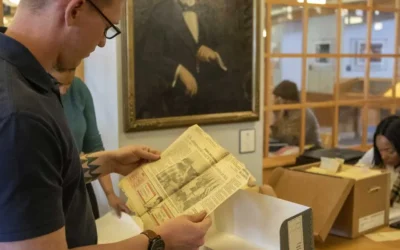Leading with History
Margot Note
In the fast-paced business world, many executives are consumed with the present and the future, often neglecting to delve into the past.
Time constraints and the ever-changing landscape leave little room for nostalgia. However, visionary leaders grasp the significance of understanding an organization’s history as a powerful tool for shaping its future. By harnessing organizational history, leaders can develop strategies, foster a sense of identity and purpose, solve problems, and drive transformative change.
Archives are invaluable for leadership, providing historical context, data-driven decision-making, accountability, and preservation of institutional memory. They ensure leaders learn from past successes and mistakes, make informed choices, and remain transparent and compliant with legal and regulatory requirements. Archives also facilitate research, innovation, crisis management, and the training of new leaders while preserving an organization’s culture, values, and mission. Archives empower leaders to effectively navigate challenges, maintain continuity, and lead with a strong sense of purpose and insight.
Harnessing Organizational History
Leaders who appreciate the power of history recognize it as a priceless resource for guiding their organization forward. By studying the past, leaders gain insights into the successes, failures, and lessons learned. They use this knowledge to devise effective strategies that align with the organization’s core values and long-term vision. Understanding the historical context allows leaders to make informed decisions, avoiding past pitfalls and capitalizing on previous achievements.
Utilizing History as a Problem-Solving Tool
Organizational history serves as a valuable problem-solving tool. As leaders analyze the past, they can identify patterns, trends, and recurring issues that need attention. By recognizing these patterns, leaders can implement targeted solutions and prevent potential problems from recurring. Moreover, understanding the past can help leaders anticipate challenges and make proactive adjustments, fostering organizational resilience and agility.
Inspiring Change through Stories
Great leaders recognize that stories have the power to inspire and motivate. By mining the rich narrative of an organization’s history, leaders can unearth powerful anecdotes and examples of perseverance, innovation, and triumph. These stories are potent tools to rally employees, engaging them emotionally and intellectually. When employees understand the impact their work can have and see how their predecessors overcame obstacles, they become more motivated to embrace change and contribute to the organization’s ongoing success.
Archives as Institutional Memory
Institutional memory, the collective knowledge and experience held within an organization over time, is a vital asset that provides numerous benefits to an organization. It serves as a repository of past successes and failures, enabling informed decision-making and the avoidance of past mistakes. This accumulated wisdom facilitates the efficient transfer of knowledge and expertise from one generation of employees to the next, ensuring continuity and organizational stability. Moreover, institutional memory fosters a sense of identity and shared values among members, reinforcing the organization’s culture and mission. Ultimately, it enhances an organization’s adaptability and resilience in the face of evolving challenges and opportunities, making it a valuable resource for long-term success.
A Lasting Legacy
Leaders who lead with history are also effective managers. By weaving the past into their decision-making processes, they create a culture that values the organization’s heritage and accomplishments. Doing so cultivates a sense of employee pride and fosters a shared understanding of the organization’s purpose and values. When leaders align their strategies with the organization’s history, they create a harmonious work environment that encourages collaboration, innovation, and growth.
Furthermore, leaders who embrace their organization’s history pave the way for a legacy. By building upon the successes and learnings of the past, they contribute to the organizational narrative. These leaders understand that today’s actions will shape the organization’s future trajectory. By acknowledging the power of history and making deliberate decisions, leaders position their companies for continued success, leaving an indelible mark on their industry and society.
While the business world often prioritizes the present and the future, leaders with an understanding of history recognize the immense value of understanding the past. By harnessing the power of organizational history, leaders gain insights, develop strategies, and solve problems. They utilize impactful stories to inspire change and foster a culture of resilience. Ultimately, leading with history allows leaders to manage their organizations more effectively and leave a legacy. To truly shape the future, we must never forget the lessons of the past.
Never miss another post. Subscribe today!
Similar Posts
Collaborative Archival Relationships
Collaborative projects are instrumental in showcasing how archival collections can benefit various organizational departments.
Informational, Evidential, and Intrinsic Values within Archives
Archives provide authentic, reliable information and hold values that reflect their functions and uses; informational, evidential, and intrinsic.
A Sustainable Archives
Archivists prioritize sustainable practices and policies, rooting their work in ethics of care, often preferring digital processing and preservation
Archival Branding and PR Strategies
Archivists who adopt branding and PR strategies both safeguard historical treasures and contribute to their organizations’ evolution.




Leave a Comment
Comments are reviewed and must adhere to our comments policy.
0 Comments